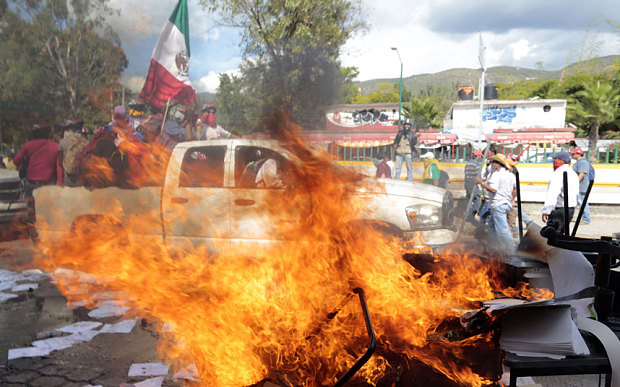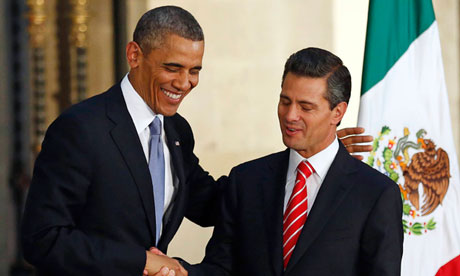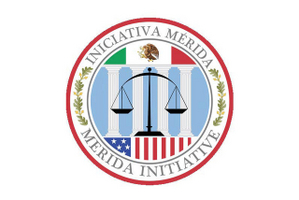On February 23rd, 2016, Mr. John M. Ackerman, a professor at the Institute for Legal Research of the National Autonomous University of Mexico (UNAM), editor-in-chief of the Mexican Law Review and a columnist for Proceso magazine and La Jornada newspaper, published an article on Foreign Policy stating that authoritarian leadership, stifled dissent, limited freedom of assembly, and endless violence are the hallmarks of Mexico under the Peña Nieto administration. And Ackerman asks the question: Is it time for Washington to pull the plug? The Yucatan Times published this article on Feb. 24 and is reposting it for the interest of its rearders:
The United States is working under the false premise that Mexico is a functioning democracy, one where federal authorities are doing their best to strengthen public institutions and uproot rampant organized crime and corruption. It is thought that crime and corruption stem principally from broken local institutions and social decay. But we need to turn this logic on its head. The real problem is at the top, not the bottom, of the Mexican political system. And the key obstacles reside within the Mexican federal government.
The upcoming U.S. presidential elections, and the ongoing Democratic and Republican primaries, present an excellent opportunity to rethink relations between the United States and its neighbor to the south. Donald Trump has proposed closing the border. Hillary Clinton defends the status quo, grounded in a vicious cycle of complicities between economic and political elites on both sides of the border.
Both of these approaches are dead ends. Instead of isolating the United States further from the Mexican people, the next president should change gears by opening up the bilateral relationship to the active participation of civil society.
Vice President Joe Biden’s Feb. 24 trip to Mexico to participate in the newly minted U.S.-Mexico High Level Economic Dialogue will showcase what is wrong with the status quo. Rather than turning towards the Mexican people and sympathizing with their suffering at the hands of an authoritarian and violent regime, Biden is likely to limit his engagements to meetings with the Mexican oligarchs and top government officials responsible for the plight of Mexico’s vibrant civil society.
Mexico apparently falls into the same foreign-policy category as Saudi Arabia. Just as the State Department is willing to overlook the gross human rights abuses of King Salman in the interests of oil and “regional stability,” it is equally willing to give Mexico´s Enrique Peña Nieto the benefit of the doubt even in the face of mounting evidence of the repressive and corrupt tendencies of his government and his party.
At the last summit between Presidents Barack Obama and Peña Nieto at the White House on January 6 of last year, Obama ratified the U.S. government´s blind support to the Mexican regime. “Our commitment is to be a friend and supporter of Mexico in its efforts to eliminate the scourge of violence and the drug cartels that are responsible for so much tragedy inside of Mexico,” he said. Obama even asked Peña Nieto to help the United States promote “human rights, democracy and political freedom” in Cuba. That´s like asking the wolf to guard the sheep.
The State Department’s most recent report on human rights in the world points the finger explicitly at Venezuela, China, Egypt, Eritrea, Ethiopia, Iran, Russia, and even Saudi Arabia. Yet for Mexico, it goes out of its way to protect national elites by locating problems strictly at the local level and among narcotraffickers. The report also flat-out lies, stating that there were “no reports of political prisoners or detainees” and that the Mexican government “generally respected” freedom of speech and assembly.
Since Peña Nieto came to power on Dec. 1, 2012, freedoms of expression, protest, and assembly, have come under systematic attack. Student activists, indigenous people, opposition politicians, and independent journalists, have been targeted in ways they never were under past administrations.
Today, Mexico is one of the most dangerous countries in the world for the press, with frequent assassinations and threats against journalists. For instance, on Feb 8, Anabel Flores Salazar, a brave, 27-year-old crime and corruption reporter became the fifteenth journalist assassinated in the state of Veracruz during the five-year reign of Gov. Javier Duarte, a close ally of Peña Nieto. Over a dozen journalists have been killed in the line of duty throughout Mexico since Peña Nieto took office. According to the free press group Article 19, the vast majority of these cases involve the direct participation of government officials.
In addition to direct violence against journalists, government censorship of the media has increased. A long list of independent journalists are excluded from radio and television for their anti-government views and Mexico´s leading radio news anchor, Carmen Aristegui, was arbitrarily fired, apparently on direct orders from the office of the president.
Meanwhile, freedom of assembly is under systematic attack, with the number of political prisoners and arbitrary detentions of activists skyrocketing in recent years. This includes the poignant case of U.S. citizen Nestora Salgado, who was detained in 2013 on trumped-up charges brought against her in revenge for her investigation of government corruption in Guerrero. Dozens of teachers who have protested against the government’s educational reform — whose objective is to replace Mexico’s long tradition of humanistic education with standardized testing in violation of teachers’ labor rights — are today behind bars. Students are systematically targeted for arbitrary detention and incarceration at marches and rallies throughout the country.
Opposition politicians have also come under fire. During the wee hours of this past January 2, Gisela Mota, the 33-year-old, newly elected mayor of Temixco, a city in southern Mexico, was taken from her bed by armed commandos and executed in cold blood. In her inaugural speech only a day before, the idealistic politician had vowed to combat organized crime both inside and outside of government. With her death, she became Mexico’s 40th mayor to have been assassinated since Peña Nieto took office.

Violent protests have erupted in Mexico since authorities said hitmen confessed to murdering the students (Photo: Telegraph UK)
Massacres committed directly by law enforcement officials also have become common. On Jan. 6, 2015, the same day Obama hosted Peña Nieto at the White House, Mexican security forces in the state of Michoacán indiscriminately mowed down over a dozen protesters and community police officers who were participating in a demonstration for peace and security in their town. This was no isolated case. Similar massacres and excessive uses of force occurred on June 30, 2014, in Tlatlaya in the state of Mexico; on September 26, 2014 in Iguala, Guerrero; on May 22, 2015, on the border between Michoacán and Jalisco; and on July 19, in Ostula, Michoacán.
In each of these cases, the federal investigation of official wrongdoing has dragged on, focusing at the lowest level of responsibility and even trafficking in blatant lies. For instance, NGOs have revealed that the massacre in Tlatlaya was apparently in response to an official military directive which calls on soldiers to “finish off” suspected criminals “at late hours of the night.” And two recent independent reports on the Iguala disappearances, one by the Inter-American Human Rights Commission and the other by a group of Argentinian forensic specialists, have completely discredited the government´s version of what supposedly happened that day to the 43 student activists from the Ayotzinapa teacher´s college.
Extreme violence is not new to Mexico. Since former President Felipe Calderon launched his militarized drug war in 2006, tens of thousands of civilians have been killed. More than 20,000 people have also been reported“disappeared” over the past decade. But in recent years, things have taken a turn for the worse. Today, the violence not only harms innocent bystanders, but is increasingly targeted at individuals who take a stand against the abuse of power.
In addition to a systematic attack on civil liberties, Peña Nieto and many of his closest operatives have also been mired in a series of high-level corruption scandals. There have been serious accusations with regard to preferential treatment for government contractors, as well as insider deals involving the purchase of mansions for the president´s wife and finance minister. Just a month ago, the man responsible for selecting Peña Nieto as the Revolutionary Institutional Party´s (PRI) 2012 presidential candidate, Humberto Moreira, was detained in Spain on money laundering charges.
When Peña Nieto’s PRI returned to power in 2012, many commentators were quick to dismiss the possibility of authoritarian retrenchment. The country’s institutions were supposedly strong enough, its economy open enough, and the ruling party sufficiently revamped so as to prevent a return to the ways of the past. Indeed, a series of panegyric reports even presented Peña Nieto as nothing short of the saving grace for all of North America.
But instead of exorcizing the ghosts of the past, the Mexican president has, in fact, put them at the helm. Today, halfway through his six-year administration, it is clear that Peña Nieto has turned his back on the Mexican people and reneged on his promises to modernize his country.
During his first presidential campaign in 2008, President Barack Obama condemned George W. Bush’s approach to Latin America as “clumsy, disinterested and, above all, distracted by the war in Iraq.” Obama promised to give high priority to Mexico in particular, pledging to organize annual summits that would be “conducted with transparency” and grounded in “active and open involvement of citizens, labor, the private sector and non-governmental organizations in setting the agenda and making progress.” Since then, two administrations and eight years have passed, and the Mexican people continue to wait for that promised democratic openness.
The voices of the Mexican people and of U.S.-based human rights organizations have been entirely shut out of the discussion. The secretive and exclusionary nature of the bilateral relationship has fueled the climate of impunity that is ripping apart the very fabric of Mexican society. The blank check that top Mexican officials receive from the U.S. government against the scrutiny of civil society on both sides of the border has allowed the situation to spin entirely out of control.
Congress and civil society have been more ambitious. On June 30, 2015, a group of over 80 members of the U.S. House of Representatives, led by Alan Lowenthal of California, sent a letter to Secretary of State John Kerry to condemn the U.S. government and “urge [him] to make the defense of human rights a fundamental part of our bilateral agenda with Mexico.” And on July 9, 2015, a group of leading American and Mexican NGOS sent a letter to Kerry and Congress that provides a full analysis of Mexico’s non-compliance with the basic human rights standards included in the Merida Initiative concerning transparency and accountability of military and law enforcement. The NGOs explicitly call for Washington to suspend all support for the Mexican armed forces since “this reinforces and sustains the inappropriate and dangerous open-ended role of the armed forces in domestic law enforcement.”
Those who seek to replace Obama at the White House would be well advised to look beyond the networks of corporate elites and Washington “foreign-policy experts” who today control the bilateral agenda. Instead, they should reach out to and listen to Mexico’s powerful and dynamic civil society, which is increasingly losing patience with the country’s simulated democracy and defective public institutions.
By John M. Ackerman
Foreign Policy magazine was founded by Harvard professor Samuel Huntington more than 40 years ago. In September 2008, it was purchased by the Washington Post Company, and in 2013 became part of Graham Holdings Company.
ForeignPolicy.com‘s audience averages more than 2.4 million monthly readers, 40 percent of which come from outside the U.S. ForeignPolicy.com publishes upwards of twenty originally-reported articles and more than a dozen regular blogs and columns each day.
Today, Foreign Policy is one of the leading international sources for global news, providing an evolving network of world-leading insights and analysis coupled with rapidly expanding original reporting.
Source: http://foreignpolicy.com/2016/02/23/obama-pena-nieto-mexico-corruption/




